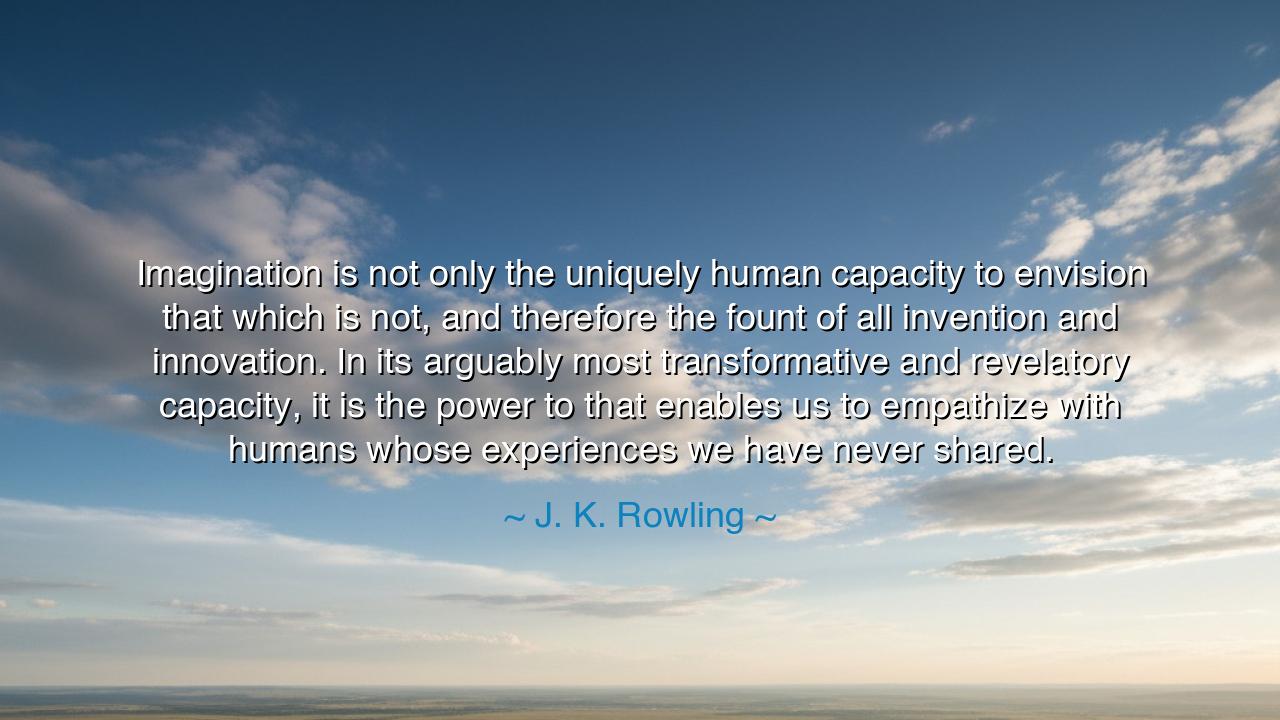
Imagination is not only the uniquely human capacity to envision
Imagination is not only the uniquely human capacity to envision that which is not, and therefore the fount of all invention and innovation. In its arguably most transformative and revelatory capacity, it is the power to that enables us to empathize with humans whose experiences we have never shared.






The Divine Gift of Imagination: The Bridge Between Worlds
Hear, O seeker of wisdom, the words of J. K. Rowling, the modern teller of myths: “Imagination is not only the uniquely human capacity to envision that which is not, and therefore the fount of all invention and innovation. In its arguably most transformative and revelatory capacity, it is the power that enables us to empathize with humans whose experiences we have never shared.” In this declaration lies the eternal truth of what makes us human — that we are not merely creatures who survive, but beings who imagine, who dream, who feel beyond the boundaries of our own lives.
Rowling speaks first of imagination as the source of creation — the wellspring from which all invention and innovation arise. It is the sacred ability to see what is not yet, to build in thought what the hands have not touched. The cave painter saw the hunt before it began; the builder of pyramids envisioned the sky meeting stone; the scientist dreamed of flight before the wings were forged. Through imagination, humanity reached beyond the present moment and seized the power to shape destiny. Without it, there would be no art, no fire, no language, no progress. It is the fire Prometheus stole from the gods, and it burns still in every human soul.
But Rowling, in her wisdom, goes beyond invention and speaks of imagination as the power of empathy — the ability to step beyond one’s self and dwell in the heart of another. This, she tells us, is imagination’s greatest and most transformative gift. For to imagine is not only to create worlds, but to understand them — to feel what another feels, to see through another’s eyes. In this way, imagination becomes not a tool of pride, but a bridge of compassion. It allows kings to feel the pain of the beggar, the comfortable to grasp the suffering of the poor, and the fortunate to share the burden of the oppressed.
Consider the story of Harriet Beecher Stowe, whose imagination gave birth to Uncle Tom’s Cabin. She never walked the path of a slave, never felt the whip or the chain, yet through the power of empathy, she envisioned their suffering so vividly that her words shook the conscience of nations. When President Abraham Lincoln met her, he said, “So you’re the little woman who wrote the book that started this great war.” Such is the force of imagination joined with compassion — it can awaken justice, stir revolutions, and transform hearts of stone into hearts of flesh.
From this union of vision and empathy, civilization itself is born. The engineer who designs bridges first imagines safety for the traveler; the doctor who heals envisions the patient’s relief; the poet who writes gives voice to the voiceless. Without imagination, there is no moral progress, for how can one seek to relieve suffering one cannot even conceive? The tyrant lacks imagination, seeing others only as shadows of himself. The hero possesses it, feeling the pain of others so deeply that he cannot rest until it is eased. Thus, empathy, born of imagination, is the highest form of strength — not soft, but sacred.
Yet, the ancients knew that this gift must be tended like a flame. When imagination is neglected, the heart grows cold; when it is corrupted, it creates horrors instead of hope. The same power that builds temples can also forge weapons. The imagination of compassion must guide the imagination of invention. As the wise of every age have said — from Buddha to Christ, from Plato to Tolstoy — true vision is not only the ability to see beyond oneself, but the willingness to love what one sees. To imagine without empathy is to dream without light.
Therefore, O listener of ages, learn from Rowling’s teaching: Use your imagination not only to create, but to connect. When you read, do not merely admire the story — enter it. When you see another’s pain, do not avert your eyes — imagine it as your own. Practice this daily, and the walls between hearts will crumble. For every act of kindness begins first in imagination — in the simple, silent belief that another’s joy or sorrow matters as much as your own.
So, remember this eternal lesson: imagination is not the escape from reality — it is the path to understanding it. It is the divine bridge between self and other, between idea and action, between what is and what could be. Cultivate it, honor it, and let it guide your hand and heart. For in the end, it is imagination, not power or reason, that redeems the world — the light that allows us to see one another truly, and to create a world worthy of our shared humanity.






AAdministratorAdministrator
Welcome, honored guests. Please leave a comment, we will respond soon